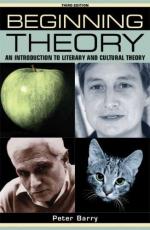|
This section contains 537 words (approx. 2 pages at 400 words per page) |

|
Feminist criticism Summary and Analysis
Feminism is renewed in the 1960s by the women's movement using works of female writers dating back to 1792 and male writers to 1869. Some notable names associated with the movement include Mary Wollstonecraft, Virginia Woolf, Simone de Beauvoir, John Stuart Mills and Friedrich Engels. Current feminist literary criticism results from that movement and is concerned with literature as a practical way to influence attitudes and behavior. Nineteenth-century fiction focuses on a woman's marital partner for her social position and happiness. Late-twentieth-century feminist critics expose this sexual inequality. By the 1980s, feminist criticism becomes eclectic by considering other forms of criticism, opens to exploring the female world's nature and outlook, and finds interest in neglected female writers. Elaine Showalter calls the change in male to female writers from "androtexts" to "gynotexts." She identifies three historical stages starting with a feminine phase...
(read more from the Feminist criticism Summary)
|
This section contains 537 words (approx. 2 pages at 400 words per page) |

|




